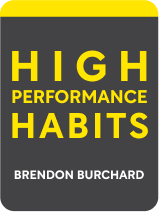

This article is an excerpt from the Shortform book guide to "High Performance Habits" by Brendon Burchard. Shortform has the world's best summaries and analyses of books you should be reading.
Like this article? Sign up for a free trial here .
Do you want to become more productive? Are there any tips and principles that can help you accomplish more in less time?
In his book High Performance Habits, Brendon Burchard shares his advice on how to become more productive. He believes that the key to increased productivity lies in planning ahead, resting regularly, and prioritizing effectively.
Keep reading for Brendon Burchard’s advice on how to become more productive.
How to Become More Productive: The Basics
To become more productive, you need to master your workflow, avoid distractions, and stay calm and collected. To do so, chart your work-life balance, take a break, then develop some advanced practices.
Chart Your Work-Life Balance
People often claim their life is “out of balance” without knowing what balance looks like. Charting your work-life balance gives you a clearer picture of what your life looks like when you feel “in balance” and “out of balance.” This exercise doesn’t focus on hours. Instead, it focuses on the amount of happiness and satisfaction you’re feeling in the various areas of your life.
To chart your work-life balance:
- Divide your life into 10 categories: family, friends, well-being, work, significant other, exploration, religion/spirituality, emotions, and money.
- Pick a day of the week (preferably a weekend if you work a typical work week).
- On that day, rate your happiness on a scale from 1-10 in each of the 10 areas.
- Once you’ve finished your ratings, write down your goals in each of the 10 areas.
- Repeat this process every week.
Think about which areas of your life are bringing you satisfaction, and which areas need more focus and attention. Focusing on how you feel about each area instead of the amount of time you’re investing in it shows you that time doesn’t necessarily correlate with happiness or contentment. For example, you could spend only four hours a day at work and still feel overwhelmed or frustrated. Conversely, you could spend only four hours a day with your family and feel happy and content.
Take a Break
Working straight through your day isn’t the best way to be efficient with your time. Though it sounds counterintuitive, taking 5-10 minute breaks every hour will help you become more productive by refreshing your mind and body. This will allow you to return to work with more focus and a clearer head.
To effectively take breaks:
- Set a timer for 45-60 minutes. Every time it goes off, step away from your computer. You could take a lap around the office, step outside for a moment, or talk to a colleague.
- Take your lunch break. When you can avoid it, don’t eat lunch at your desk. Take that time to get away from your work for a few minutes and refresh.
- Stand up and move. Don’t just sit at your desk to take your breaks. Moving around lets your body release any tension you may have built up from sitting at your computer.
- Stay away from social media and messages. Especially if you’re on a computer all day, use your break to get away from screens. This is time for you to focus on yourself, not other people.
Become More Productive: Advanced Practices
Once you’ve completed the first two steps, you can move on to the more advanced methods of increasing efficiency: Prioritize your time, plan your “five moves,” and master “essential” skills.
Prioritize Your Time
Your time and energy are finite. If you want to become more productive, you have to focus on the tasks that are most important to your goals. Anything that doesn’t contribute to your goals is secondary and shouldn’t be given significant amounts of focus. Things such as deleting junk e-mail, attending unnecessary meetings, and attending to false emergencies can distract you from your important tasks. For example, if you’re a business owner with the priority of selling more products, you shouldn’t spend a significant amount of time creating complex internal memos. Write succinct, to-the-point emails, then use your time to analyze market research, find potential buyers, improve your product, and develop a strong marketing plan.
Plan Your “Five Moves”
High performance requires strategic action towards an objective. If you don’t plan for your long-term goals, you likely won’t achieve them because you won’t know what’s important. While you may be working hard, you may be giving too much energy to nonessential projects or “busy work.”
Creating a roadmap can help you become more productive and channel your energy into the tasks that are most important to your success. To create a long-term plan, find your “five moves:”
- Solidify your goal. Make sure it’s clear and specific.
- Write down the five major moves you’d need to make to achieve that goal. These are big steps that require many smaller tasks to achieve. For example, if your goal is to become a published author, one of your major steps may be to “get a literary agent” or “find a way to self-publish.”
- Under each of your five major moves, write down a list of tasks that you need to do to accomplish that step. For example, under “get a literary agent,” your tasks would include researching agencies, crafting writing samples, fixing up your resume, and practicing your interviewing skills.
- Once you have a list of tasks, put them into your calendar and hold yourself to hard deadlines. Giving yourself a specific schedule will motivate you to complete tasks in a timely manner.
Master Important Skills
People often make the excuse that they’re “just not equipped” to learn a new skill. However, you can learn to do almost anything with time and effort.
To start your journey towards mastery, define the five most important skills in your field. Constantly be on the lookout for new educational opportunities and improved ways of working. The more you know about the essential elements of your field, the more effectively you’ll be able to work. For example, if you’re a salesperson, important skills include communication, problem-solving, customer service, negotiation, and market awareness.
Note: As you find the skills you need to develop, don’t rely on mindless repetition. While mindless repetition can produce some results, it’s not the best way to improve. For example, a runner looking to improve their time can run the same route every day, but, if they’re not pushing themselves to beat personal records, they won’t see significant improvement.
Instead of simple repetition, practice progressive mastery to improve your skills. Progressive mastery relies on setting increasingly challenging goals, attaching meaning to your process, and using teaching as a method to learn. Here are the steps of progressive mastery:
- Define the skill you want to work on.
- Make long-term stretch goals that will challenge you.
- Attach meaning to your work by reminding yourself why it’s important.
- Visualize success and failure.
- Schedule time to practice challenges and exercises created by experts.
- Chart your progress and invite external feedback.
- Share your learning experience by competing or practicing with others.
- If you reach a goal, set another goal that challenges you even further.
- Take time to teach others what you’re learning.

———End of Preview———
Like what you just read? Read the rest of the world's best book summary and analysis of Brendon Burchard's "High Performance Habits" at Shortform .
Here's what you'll find in our full High Performance Habits summary :
- The 6 habits that high performers have
- How being a high performer is about more than one big achievement
- The 3 traps that can foil you, even if you're a high performer






